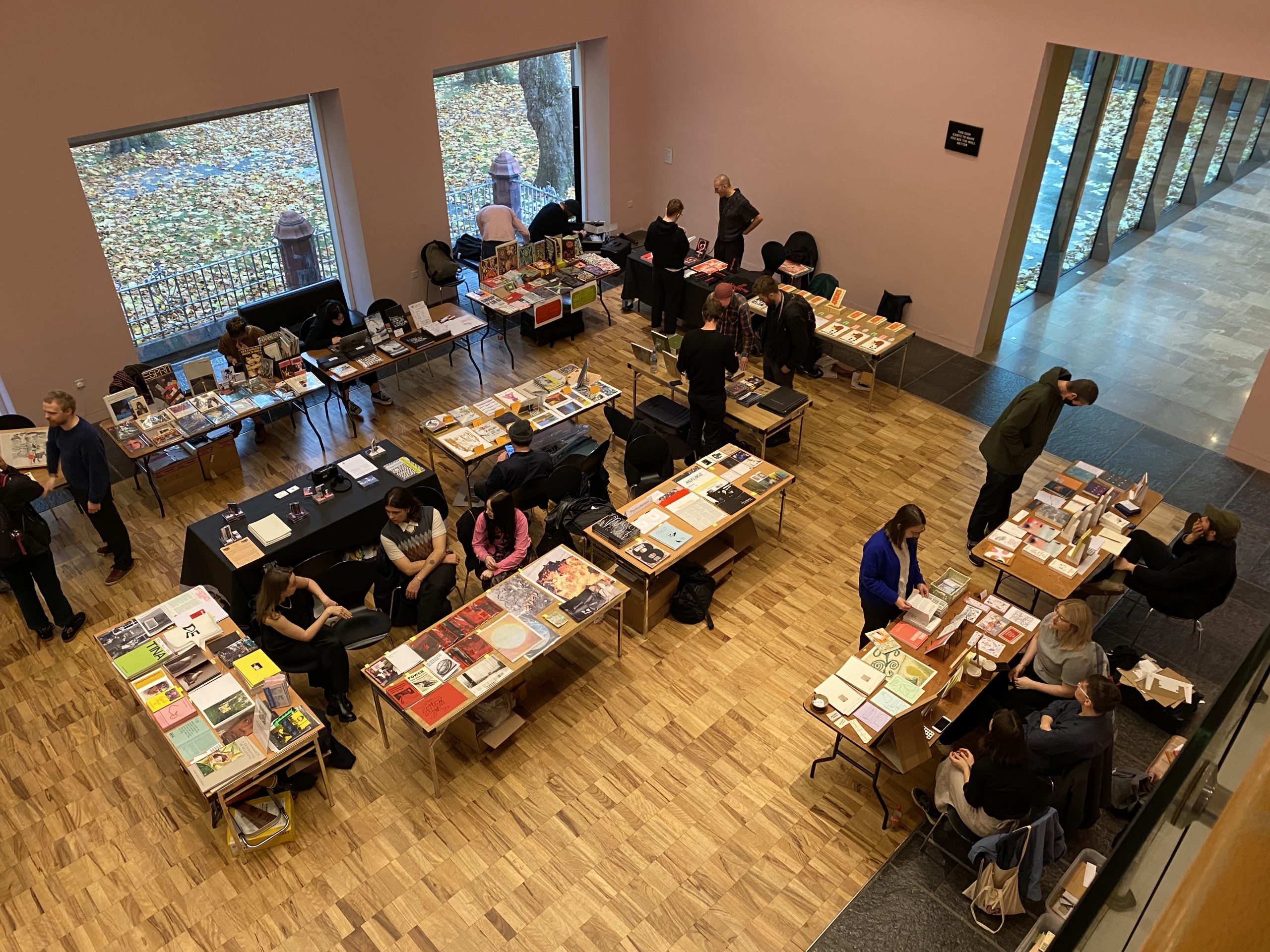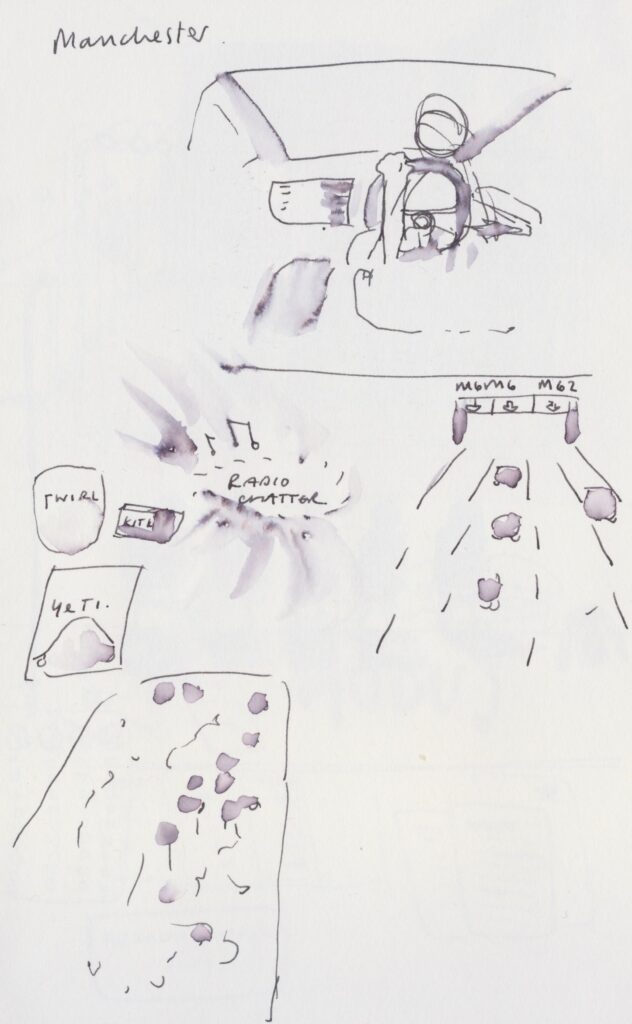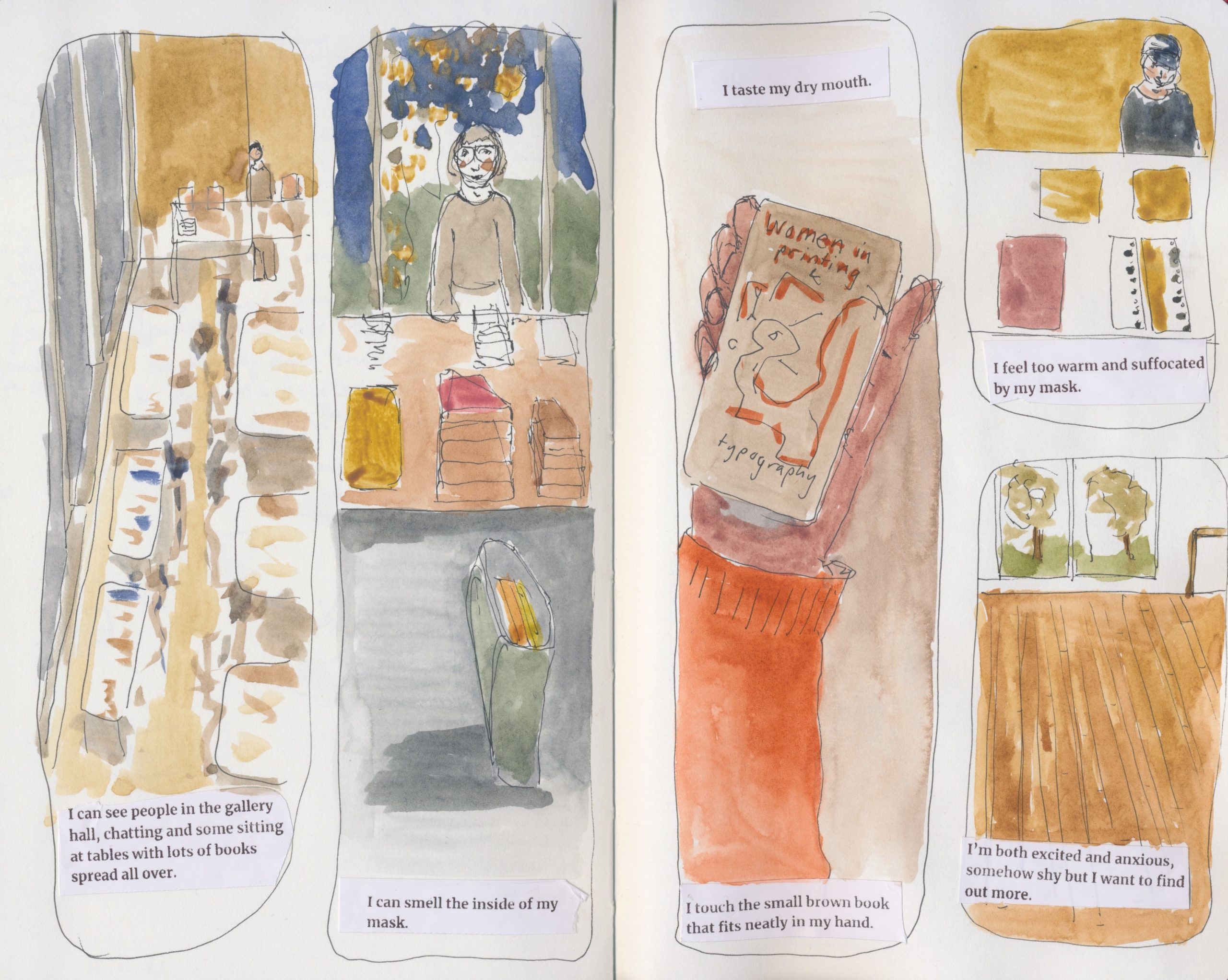
»It’s a Comic!« Drawing as a Research Tool to Understand Post-Digital Book Cultures
Self-organised and institutionally hosted artists’ book fairs and the range of artist-publishing they represent offer valuable insights into a relatively under-researched area of publishing. These insights include an understanding of the meanings and motivations behind creating comics, zines and artists’ publications. I have been gaining an understanding of how these publications are produced, circulate through the fairs’ networks, and communities of readers, producers and publishers by attending two artists’ book fairs in 2021.
Self-organised and institutionally hosted artists’ book fairs and the range of artist-publishing they represent offer valuable insights into a relatively under-researched area of publishing. These insights include an understanding of the meanings and motivations behind creating comics, zines and artists’ publications. I have been gaining an understanding of how these publications are produced, circulate through the fairs’ networks, and communities of readers, producers and publishers by attending two artists’ book fairs in 2021.
Drawing as a research method within an autoethnographic research approach produces new insights into artists’ book fairs. I use drawing to capture a moment of an experience and convey an emotive aspect of that experience, which speaks to something that words on their own can’t convey. I use Instagram (@louisapreston_scribo) as a site of publication for my drawings, to share my reflections and explorations of my lived experience in a small city in Scotland, and to find others who use drawing for similar or different ends to my own in becoming part of an evolving community of comic artists, zine-makers, artists’ publishers, researchers and illustrators.
I was asked by the lovely folks at WiRe to write a blog post on why my research on artists’ book fairs matters. The research process can feel like a hike up a steep mountain at times! But why does my autoethnographic research, which utilises drawing and creative research methods to investigate artists’ book fairs matter? – and is the hike worth it?!
Autoethnographic Research: From My Lived Experience to Research
My autoethnographic research approach utilises drawing as a research method and my lived experience as the lens through which I am generating insights into artists’ book fairs and comic and zine fairs. My understanding of these aspects of the artists’ book fair and participants involved derives from my own experience as an artist who trained at DJCAD in Dundee. As an artist-publisher-researcher and a mother, I too seek to find my place in this world in a way that combines my drive for creative expression and the clarity that drawing gives that writing can’t of a particular kind of tacit understanding. The artists’ book fair and the comic and zine fair I am using as case studies in this research are investigated and understood from this positioning.
Drawing is an expressive tool for understanding and exploring an emotive experience. Drawings, illustrated notes and memory poetry comics I create capture a moment and produce emotive insights of my experience. This uniquely contributes to existing literature in the area of book fairs and literary festivals as the visual materials I am generating contribute an emotive and personal experience to the understanding from a researcher-practitioner perspective.

The Bigger Picture: Post-Digital Book Cultures and the Visual Arts
Before explaining what artists’ book fairs are, it’s worth briefly saying how this research relates to the bigger picture. Post-Digital is a term used by researchers to reflect the current status of our communications, production, consumption and dissemination processes today. The term does not simply refer to a time after digital technologies began to disrupt certain processes, especially those for publishers. Rather, it reflects the mix of digital and analogue technologies used in these processes and the ability for people to ‘do-it-yourself’ via the advancement of personal computers and digital devices we have at our disposal that no longer requires specialist technologies or knowledge to use.
Within this framing, my research investigates the modes and functions that artist-publishing reveals and the agendas at play in the processes of producing, consuming and disseminating artists’ books. It seeks to understand these aspects of the artists’ book fair and artist-publishing and relate them to their counterpart book fairs in the literary network. It considers the stakes for artists and organisers of artists’ books fairs and their positioning in this area of publishing to the mainstream book publishing industry.
A niche area of Publishing as Case Study: Artists’ Book Fairs & Comic and Zine Fairs
Research in artists’ book fairs and comic and zine fairs is important as the number of fairs has been increasing in recent years in the UK. These online and in-person events celebrate artists’ publishing and the variety of experimental formats, modes and motivations for publications produced in this niche area of publishing. They offer valuable insights to wider research in post-digital book cultures.
Artists’ book fairs bring together people with similar interests, namely the pursuit of disseminating their creative ideas and fostering debate on contemporary issues. They foster and create communities of people who are interested in becoming a publisher of their own work and who then in turn may be published by a small press or larger publisher. The Manchester Bound Art Book Fair, hosted by the Whitworth Art Gallery, had a mixture of independent art publishers and zine makers presenting their publications.

Similarly, comic and zine fairs celebrate the comic artform and experimental formats linked to comics. The Hackney Comic and Zine Fair which I attended in September 2021 was a self-organised fair (organised by Joe Stone) that encouraged and supported attendees’ work at workshops and showcased celebrated comic artists and zine makers through the virtual fair tables and panel discussion events. Zines (a name which derives from magazine) are small hand-made and cheaply reproduced pamphlets or booklets which are made by either stapling the pages or creating pages by folding down a single sheet. (For more on zines I recommend Notes from the Underground by Stephen Duncombe). Individual creatives of zines and comics seek out discussion with peers to help with challenges of production or with seeking second opinions of their work. Motives behind creating the works for the comic and zine maker include: seeking clarity of their position in the world, to understand how they might be different or how they might endure a particular facet of their mental or physical well-being for example.
Hackney Comic and Zine Fair (HCZF), September 2021.
I attended the Hackney Comic and Zine Fair in September 2021. This was an online fair with a programme of events spanning the month of September. Instagram was a main channel for the organisers of the fair to communicate information about the programme. Attendees of the fair also used Instagram to post their reactions and share their work with others, which I also participated in. The online fair offered me the opportunity to attend from my home in Perth, which meant there were no travel time and cost requirements for me to attend. I was able to use my laptop and could situate myself anywhere that I felt most comfortable. Events I attended included: ‘The Power of the Small Press’; ‘Abstraction in Comics’; ‘All Comics No Time’; ‘Manga and Asian Comics’ and a ‘One-page Comic Workshop’.
‘The Power of the Small Press’ was a talk by Gareth Brookes. Brookes spoke of the fact that in 2005 there were no publishers making the kind of works that he was. There were no anthologies and no printers. He would use a photocopier at work or his home printer. By 2010, he noted the publishers Myriad and No Brow had been set up but that people were essentially working out of their kitchens. The so-called big publishers in this area were really small presses. He also pointed out that the low numbers of print runs and publishers of comics and zines were largely comprised of under-represented groups. Speaking of the materiality of some kinds of comics he said, “it’s what the art wants to be, small-press published”.
Manchester Bound Art Book Fair, October 2021.
In contrast to HCZF, Manchester Bound Art Book Fair was hosted by the Whitworth Gallery and as such could be understood as an institutionally hosted fair compared to HCZF. Art publishers and self-publishers were presenting their publications at tables in one of the gallery spaces. Social issues, feminism and gender equality are some of the topics that publications and publishers at this fair addressed. A two-part zine on ‘Radical Bookstores’ for example aimed to highlight to the interested reader a collection of places to find books, zines and pamphlets on radical and political thought.
Modus is a publication which is associated with a research project of the same name on fashion. The project aims to generate dialogue between the theory and practice of fashion, supporting “expanded ways of thinking being and doing fashion”. I attended a hands-on workshop led by the two principal investigators of the project as part of the fair programme.
We were given the publication and introduced to the project before being asked to cut up parts of the publication and then stick parts of those cuttings back onto it with the addition of other images. This interactive and creative workshop was interesting for my research because of the use of the publication as a tool generating insights from the workshop participants in unforeseen and creative ways. Participants of the workshop could take away their finished version of the Modus publication afterwards. We were also encouraged to share our thoughts of what fashion is on the project website.
My journey from Perth, Scotland to Manchester is documented as part of this art fair experience through my memory poetry comics. In addition, sketches and writing add further reflections of my attendance of the book fair as an artist-publisher-researcher.





In terms of the interests of my research and the experiences highlighted here, the networks of production and consumption involved and the motivations for creating these types of art and zine publishing and the fairs that are organised around them are producing insights into a post-digital mode of artist-publishing, art publishers, and self-publishing. Practices of creating, communicating and sharing involve a degree of do-it-yourself gusto, digital and analogue formats, professional and non-professional agents, which coalesce at the artists’ book fairs and comic and zine fairs, online and in-person. Low numbers of production, a high degree of personalisation and an emphasis on supportive communities of creativity which celebrate the comic, zine and artists’ book format are indicative of artists’ book fairs. My analysis is still ongoing, but I hope that the highlights of my research here show the value of artists’ book fairs and the autoethnographic approach to research in this area.
